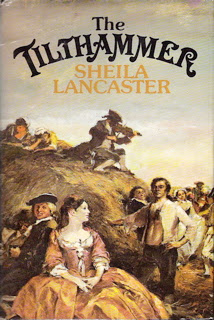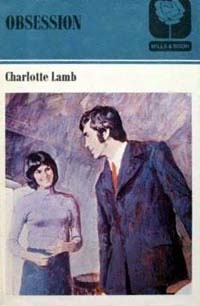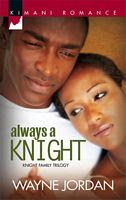The Tilthammer (Hodder & Stoughton, 1980)
Although best known for her short romantic novels written under the name Charlotte Lamb, my mother also wrote three long historical novels under the pseudonym Sheila Lancaster. The Tilthammer was a gritty northern romance, set against the backdrop of the Industrial Revolution. Another Lancaster novel, Dark Sweet Wanton was a more sophisticated and lyrical story about the supposed 'Dark Lady' mentioned in Shakespeare's sonnets. Mistress of Fortune was her last novel under that pseudonym; I don't have a copy of it, unfortunately, but I believe it to be her epic historical novel based on Josephine, the notorious mistress of Napoleon Bonaparte.

A 'tilthammer' is a mechanical industrial hammer which pounds rhythmically as it works; such was the startling and brutal image behind the title of this romance, and its narrative drive is equally brutal and determined. This is reinforced during one scene where the heroine Hannah inadvertently witnesses the hero Joss having sex with another woman and is horrified but fascinated by his strength and forcefulness as a lover, describing him as a 'tilthammer'. And that scene is typical of this novel in terms of its shocking but compulsive engagement of the reader.
But The Tilthammer is an unusual historical romance throughout. Instead of moonlit love and flights from ballrooms, this story deals with the extremes of rape, murder, execution, adultery, pregnancy outside marriage, sickness, prostitution and death. But eventually, love forces these two proud and bitterly opposed survivors, Hannah Noble and Joss Colby, together in spite of themselves.
Joss Colby is the manager of the ironworks. Hannah Noble is the illegitimate daughter of the ironmaster's brother. He needs to marry well and initially refuses to give in to the strong sexual attraction between them. For Hannah's part, she loathes the man's ruthlessness, the way he pushes and uses people to achieve his business ambitions. But in the true tradition of the romantic novel, even she can't deny the chemistry between them, which eventually takes both of them over.
It's a strangely internal book, and one which deliberately keeps love at arm's length until the last possible moment. The small cluster of characters with a narrative point of view rarely communicate with each other directly or honestly; irony and lies form their usual verbal exchanges. Indeed, much of the book's dynamic happens within the characters' minds as they observe others and react internally with disgust, boredom, anger, lust.
Love is not something which comes to light in The Tilthammer until late in the book. Then it's an emotion to be hated and resisted, more of a torment than a delight. Hannah feels it will reduce her to a mere vessel for Joss Colby's lust, as sex has done for many of the other women around her. Joss feels trapped by it too, but in a man's terms; he wants to be free to choose his own destiny, to marry for status, but his love for Hannah seems set to ruin that ambition.
Echoing the confusion and emotional dislocation of these characters, the quiet rural lifestyle of northern England at that time was rapidly changing into a more decadent and outward-looking society, driven by the constant industrial concerns of supply and demand rather than the predictable cycle of the seasons.
The rapid change in society during the Industrial Revolution is a perfect backdrop for this romance, focussing as it does on the increasing issue of social mismatch - the young aristocratic Andrew who falls in love with the illegitimate Hannah, the various infidelities of Lady Arandall with a succession of valets and stable-boys, and finally Joss Colby, son of a blacksmith, who sets his eyes high on financial success as manager of the ironworks. The intricate twists and turns of this story were, I'm sure, at least partly inspired by my mother's love of Thomas Hardy's work and vision, another writer who explored increasing social changes through the troubled lives of those people most affected by them.
The 1985 Fontana Books edition changes the book's title to A Woman Of Iron, which I find equally effective as an image, and is perhaps more woman-friendly than The Tilthammer as a title. But of the two, I prefer The Tilthammer as a more daring choice for a romantic novel.

A 'tilthammer' is a mechanical industrial hammer which pounds rhythmically as it works; such was the startling and brutal image behind the title of this romance, and its narrative drive is equally brutal and determined. This is reinforced during one scene where the heroine Hannah inadvertently witnesses the hero Joss having sex with another woman and is horrified but fascinated by his strength and forcefulness as a lover, describing him as a 'tilthammer'. And that scene is typical of this novel in terms of its shocking but compulsive engagement of the reader.
But The Tilthammer is an unusual historical romance throughout. Instead of moonlit love and flights from ballrooms, this story deals with the extremes of rape, murder, execution, adultery, pregnancy outside marriage, sickness, prostitution and death. But eventually, love forces these two proud and bitterly opposed survivors, Hannah Noble and Joss Colby, together in spite of themselves.
Joss Colby is the manager of the ironworks. Hannah Noble is the illegitimate daughter of the ironmaster's brother. He needs to marry well and initially refuses to give in to the strong sexual attraction between them. For Hannah's part, she loathes the man's ruthlessness, the way he pushes and uses people to achieve his business ambitions. But in the true tradition of the romantic novel, even she can't deny the chemistry between them, which eventually takes both of them over.
It's a strangely internal book, and one which deliberately keeps love at arm's length until the last possible moment. The small cluster of characters with a narrative point of view rarely communicate with each other directly or honestly; irony and lies form their usual verbal exchanges. Indeed, much of the book's dynamic happens within the characters' minds as they observe others and react internally with disgust, boredom, anger, lust.
Love is not something which comes to light in The Tilthammer until late in the book. Then it's an emotion to be hated and resisted, more of a torment than a delight. Hannah feels it will reduce her to a mere vessel for Joss Colby's lust, as sex has done for many of the other women around her. Joss feels trapped by it too, but in a man's terms; he wants to be free to choose his own destiny, to marry for status, but his love for Hannah seems set to ruin that ambition.
Echoing the confusion and emotional dislocation of these characters, the quiet rural lifestyle of northern England at that time was rapidly changing into a more decadent and outward-looking society, driven by the constant industrial concerns of supply and demand rather than the predictable cycle of the seasons.
The rapid change in society during the Industrial Revolution is a perfect backdrop for this romance, focussing as it does on the increasing issue of social mismatch - the young aristocratic Andrew who falls in love with the illegitimate Hannah, the various infidelities of Lady Arandall with a succession of valets and stable-boys, and finally Joss Colby, son of a blacksmith, who sets his eyes high on financial success as manager of the ironworks. The intricate twists and turns of this story were, I'm sure, at least partly inspired by my mother's love of Thomas Hardy's work and vision, another writer who explored increasing social changes through the troubled lives of those people most affected by them.
The 1985 Fontana Books edition changes the book's title to A Woman Of Iron, which I find equally effective as an image, and is perhaps more woman-friendly than The Tilthammer as a title. But of the two, I prefer The Tilthammer as a more daring choice for a romantic novel.


Jane, I am a huge fan of your mother's novels and love her M&Bs as well as her single title romantic suspense romances for Hodder. I remember reading in a magazine which had excerpted her final novel, Angel of Death, that she was a modern day Daphne Du Maurier and I really do agree as her Hodder books were wonderfully suspenseful, fabulously exotic and romantic as well.
ReplyDeleteI discovered that she wrote sagas and historicals only when you created this blog and rushed to the library to see if they had any and much to my delight, they've got A Woman of Iron. I've already reserved it at the library and look forward to reading it.
Love,
Julie
That's marvellous to know, Julie; thanks for leaving your message and I hope you enjoy A WOMAN OF IRON. It was always one of my personal favourites among her historicals. Some more delicate souls might find it tough-going, but I love her darker fiction, I really do. And hopefully you'll become a fan of this book too. Do leave another comment when you've read it, let us know what you thought!
ReplyDeleteJane x